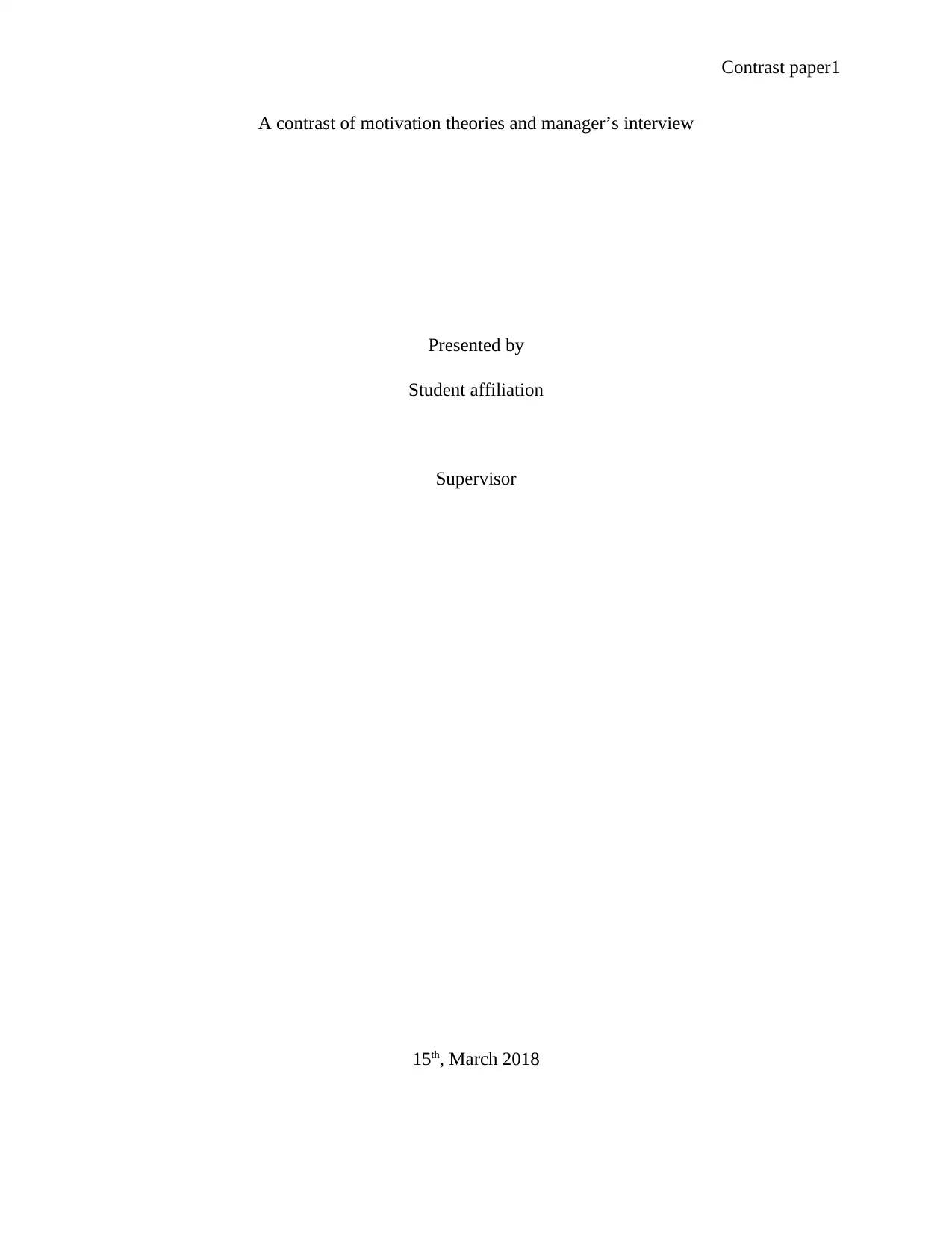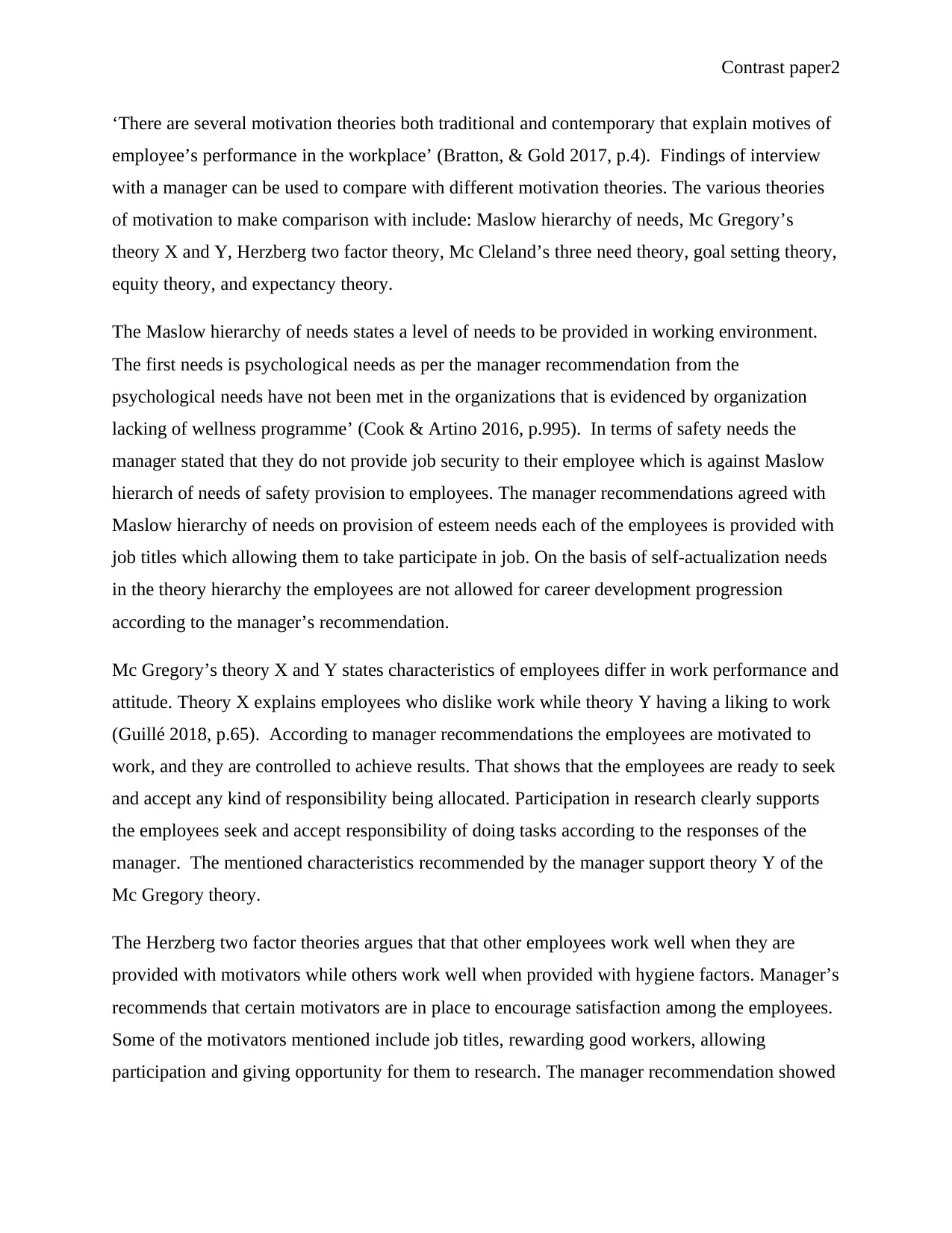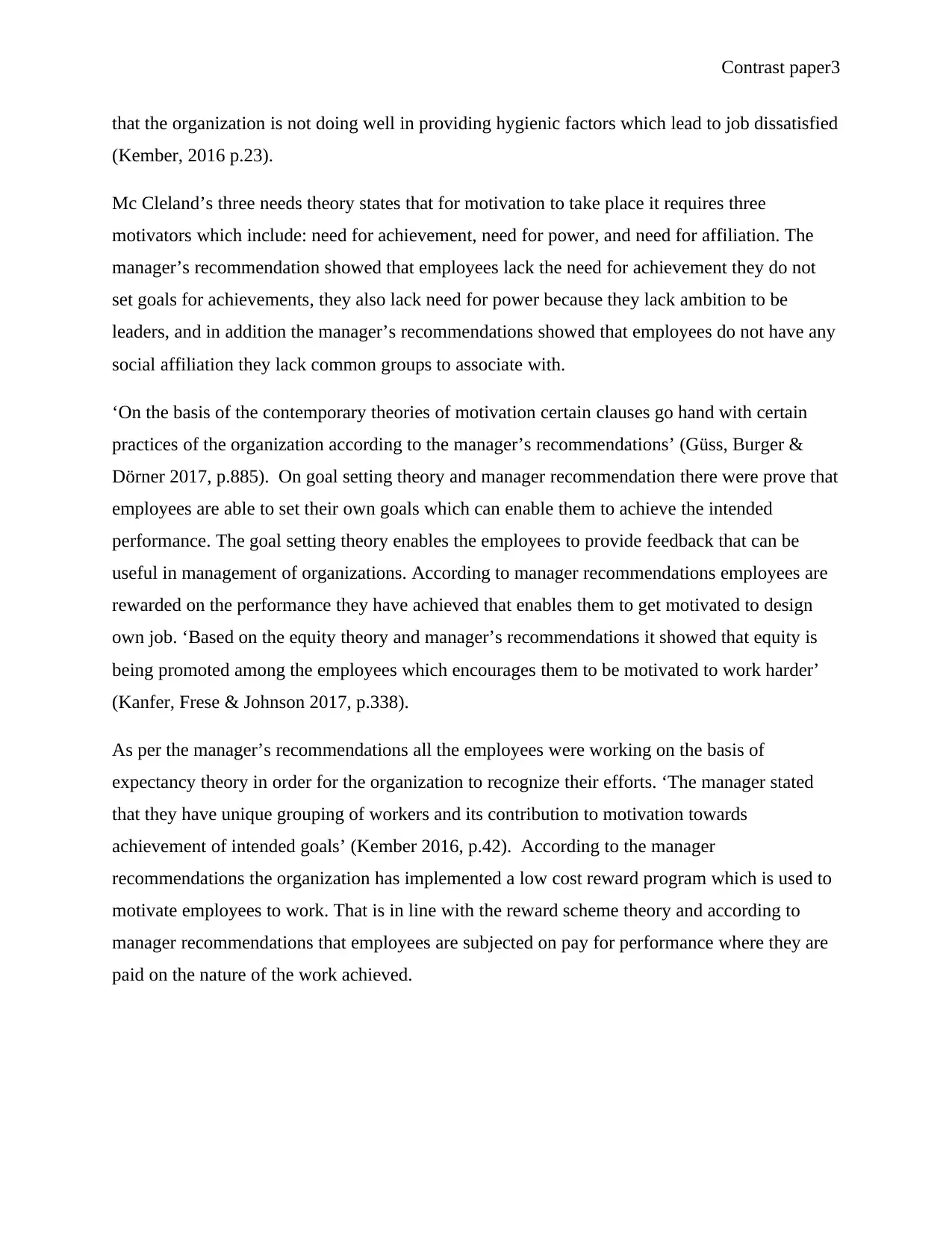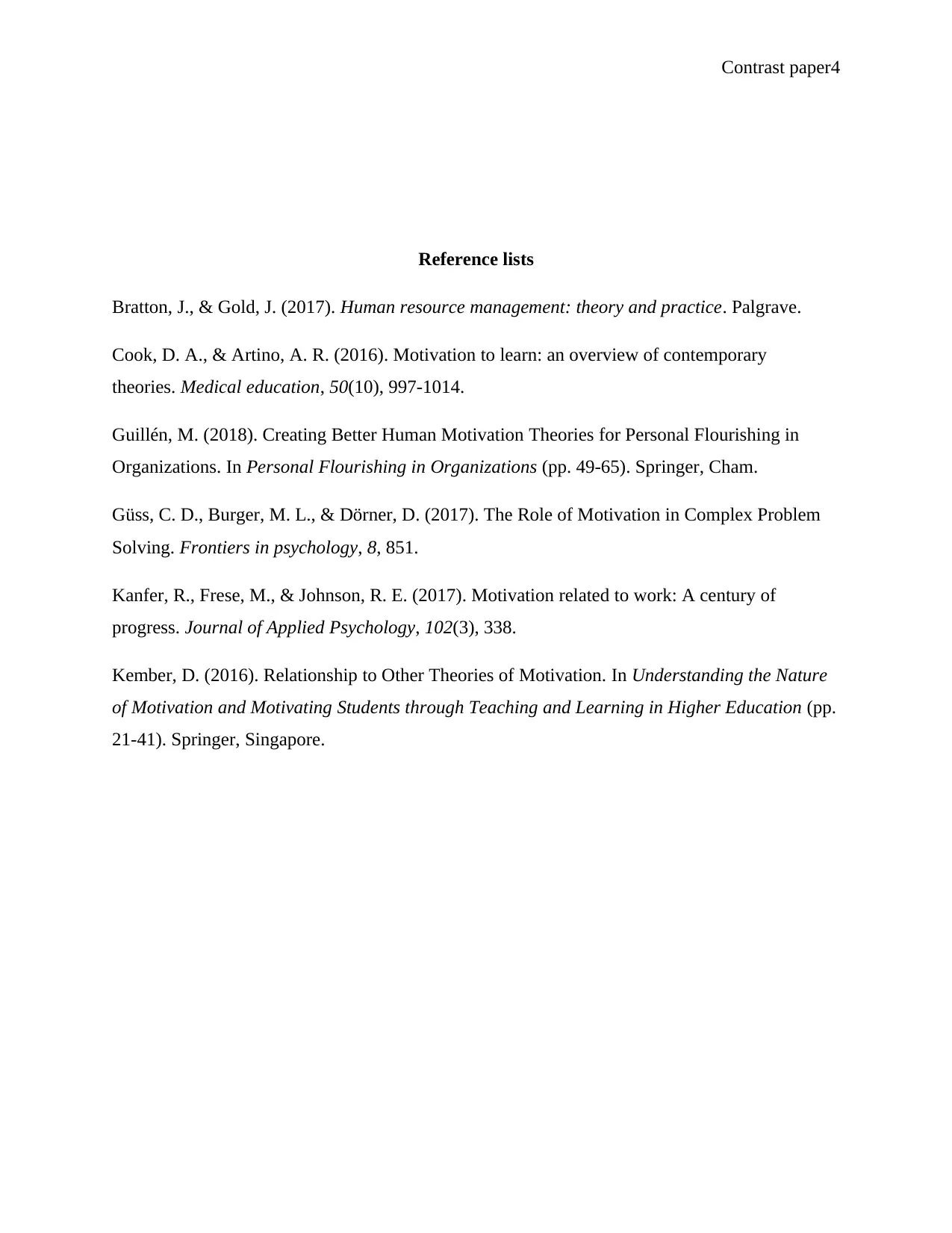Contrast of Motivation Theories & Manager's Interview Analysis Report
VerifiedAdded on 2021/04/16
|4
|1044
|36
Report
AI Summary
This report provides a contrast between various motivation theories and the insights gained from an interview with a manager. It explores the application of traditional and contemporary motivation models, including Maslow's Hierarchy of Needs, McGregor's Theory X and Y, Herzberg's Two-Factor Theory, McClelland's Three Needs Theory, Goal Setting Theory, Equity Theory, and Expectancy Theory. The analysis compares the manager's recommendations and observations with the principles of each theory, highlighting the alignment and discrepancies. The report examines the provision of employee needs, job security, the impact of motivators and hygiene factors, the role of achievement, power, and affiliation, and the influence of goal setting and equity on employee motivation. It also discusses the organization's reward programs and their effectiveness in motivating employees. The findings offer a comprehensive overview of employee motivation strategies and their practical application within an organizational context.

Contrast paper1
A contrast of motivation theories and manager’s interview
Presented by
Student affiliation
Supervisor
15th, March 2018
A contrast of motivation theories and manager’s interview
Presented by
Student affiliation
Supervisor
15th, March 2018
Paraphrase This Document
Need a fresh take? Get an instant paraphrase of this document with our AI Paraphraser

Contrast paper2
‘There are several motivation theories both traditional and contemporary that explain motives of
employee’s performance in the workplace’ (Bratton, & Gold 2017, p.4). Findings of interview
with a manager can be used to compare with different motivation theories. The various theories
of motivation to make comparison with include: Maslow hierarchy of needs, Mc Gregory’s
theory X and Y, Herzberg two factor theory, Mc Cleland’s three need theory, goal setting theory,
equity theory, and expectancy theory.
The Maslow hierarchy of needs states a level of needs to be provided in working environment.
The first needs is psychological needs as per the manager recommendation from the
psychological needs have not been met in the organizations that is evidenced by organization
lacking of wellness programme’ (Cook & Artino 2016, p.995). In terms of safety needs the
manager stated that they do not provide job security to their employee which is against Maslow
hierarch of needs of safety provision to employees. The manager recommendations agreed with
Maslow hierarchy of needs on provision of esteem needs each of the employees is provided with
job titles which allowing them to take participate in job. On the basis of self-actualization needs
in the theory hierarchy the employees are not allowed for career development progression
according to the manager’s recommendation.
Mc Gregory’s theory X and Y states characteristics of employees differ in work performance and
attitude. Theory X explains employees who dislike work while theory Y having a liking to work
(Guillé 2018, p.65). According to manager recommendations the employees are motivated to
work, and they are controlled to achieve results. That shows that the employees are ready to seek
and accept any kind of responsibility being allocated. Participation in research clearly supports
the employees seek and accept responsibility of doing tasks according to the responses of the
manager. The mentioned characteristics recommended by the manager support theory Y of the
Mc Gregory theory.
The Herzberg two factor theories argues that that other employees work well when they are
provided with motivators while others work well when provided with hygiene factors. Manager’s
recommends that certain motivators are in place to encourage satisfaction among the employees.
Some of the motivators mentioned include job titles, rewarding good workers, allowing
participation and giving opportunity for them to research. The manager recommendation showed
‘There are several motivation theories both traditional and contemporary that explain motives of
employee’s performance in the workplace’ (Bratton, & Gold 2017, p.4). Findings of interview
with a manager can be used to compare with different motivation theories. The various theories
of motivation to make comparison with include: Maslow hierarchy of needs, Mc Gregory’s
theory X and Y, Herzberg two factor theory, Mc Cleland’s three need theory, goal setting theory,
equity theory, and expectancy theory.
The Maslow hierarchy of needs states a level of needs to be provided in working environment.
The first needs is psychological needs as per the manager recommendation from the
psychological needs have not been met in the organizations that is evidenced by organization
lacking of wellness programme’ (Cook & Artino 2016, p.995). In terms of safety needs the
manager stated that they do not provide job security to their employee which is against Maslow
hierarch of needs of safety provision to employees. The manager recommendations agreed with
Maslow hierarchy of needs on provision of esteem needs each of the employees is provided with
job titles which allowing them to take participate in job. On the basis of self-actualization needs
in the theory hierarchy the employees are not allowed for career development progression
according to the manager’s recommendation.
Mc Gregory’s theory X and Y states characteristics of employees differ in work performance and
attitude. Theory X explains employees who dislike work while theory Y having a liking to work
(Guillé 2018, p.65). According to manager recommendations the employees are motivated to
work, and they are controlled to achieve results. That shows that the employees are ready to seek
and accept any kind of responsibility being allocated. Participation in research clearly supports
the employees seek and accept responsibility of doing tasks according to the responses of the
manager. The mentioned characteristics recommended by the manager support theory Y of the
Mc Gregory theory.
The Herzberg two factor theories argues that that other employees work well when they are
provided with motivators while others work well when provided with hygiene factors. Manager’s
recommends that certain motivators are in place to encourage satisfaction among the employees.
Some of the motivators mentioned include job titles, rewarding good workers, allowing
participation and giving opportunity for them to research. The manager recommendation showed

Contrast paper3
that the organization is not doing well in providing hygienic factors which lead to job dissatisfied
(Kember, 2016 p.23).
Mc Cleland’s three needs theory states that for motivation to take place it requires three
motivators which include: need for achievement, need for power, and need for affiliation. The
manager’s recommendation showed that employees lack the need for achievement they do not
set goals for achievements, they also lack need for power because they lack ambition to be
leaders, and in addition the manager’s recommendations showed that employees do not have any
social affiliation they lack common groups to associate with.
‘On the basis of the contemporary theories of motivation certain clauses go hand with certain
practices of the organization according to the manager’s recommendations’ (Güss, Burger &
Dörner 2017, p.885). On goal setting theory and manager recommendation there were prove that
employees are able to set their own goals which can enable them to achieve the intended
performance. The goal setting theory enables the employees to provide feedback that can be
useful in management of organizations. According to manager recommendations employees are
rewarded on the performance they have achieved that enables them to get motivated to design
own job. ‘Based on the equity theory and manager’s recommendations it showed that equity is
being promoted among the employees which encourages them to be motivated to work harder’
(Kanfer, Frese & Johnson 2017, p.338).
As per the manager’s recommendations all the employees were working on the basis of
expectancy theory in order for the organization to recognize their efforts. ‘The manager stated
that they have unique grouping of workers and its contribution to motivation towards
achievement of intended goals’ (Kember 2016, p.42). According to the manager
recommendations the organization has implemented a low cost reward program which is used to
motivate employees to work. That is in line with the reward scheme theory and according to
manager recommendations that employees are subjected on pay for performance where they are
paid on the nature of the work achieved.
that the organization is not doing well in providing hygienic factors which lead to job dissatisfied
(Kember, 2016 p.23).
Mc Cleland’s three needs theory states that for motivation to take place it requires three
motivators which include: need for achievement, need for power, and need for affiliation. The
manager’s recommendation showed that employees lack the need for achievement they do not
set goals for achievements, they also lack need for power because they lack ambition to be
leaders, and in addition the manager’s recommendations showed that employees do not have any
social affiliation they lack common groups to associate with.
‘On the basis of the contemporary theories of motivation certain clauses go hand with certain
practices of the organization according to the manager’s recommendations’ (Güss, Burger &
Dörner 2017, p.885). On goal setting theory and manager recommendation there were prove that
employees are able to set their own goals which can enable them to achieve the intended
performance. The goal setting theory enables the employees to provide feedback that can be
useful in management of organizations. According to manager recommendations employees are
rewarded on the performance they have achieved that enables them to get motivated to design
own job. ‘Based on the equity theory and manager’s recommendations it showed that equity is
being promoted among the employees which encourages them to be motivated to work harder’
(Kanfer, Frese & Johnson 2017, p.338).
As per the manager’s recommendations all the employees were working on the basis of
expectancy theory in order for the organization to recognize their efforts. ‘The manager stated
that they have unique grouping of workers and its contribution to motivation towards
achievement of intended goals’ (Kember 2016, p.42). According to the manager
recommendations the organization has implemented a low cost reward program which is used to
motivate employees to work. That is in line with the reward scheme theory and according to
manager recommendations that employees are subjected on pay for performance where they are
paid on the nature of the work achieved.
⊘ This is a preview!⊘
Do you want full access?
Subscribe today to unlock all pages.

Trusted by 1+ million students worldwide

Contrast paper4
Reference lists
Bratton, J., & Gold, J. (2017). Human resource management: theory and practice. Palgrave.
Cook, D. A., & Artino, A. R. (2016). Motivation to learn: an overview of contemporary
theories. Medical education, 50(10), 997-1014.
Guillén, M. (2018). Creating Better Human Motivation Theories for Personal Flourishing in
Organizations. In Personal Flourishing in Organizations (pp. 49-65). Springer, Cham.
Güss, C. D., Burger, M. L., & Dörner, D. (2017). The Role of Motivation in Complex Problem
Solving. Frontiers in psychology, 8, 851.
Kanfer, R., Frese, M., & Johnson, R. E. (2017). Motivation related to work: A century of
progress. Journal of Applied Psychology, 102(3), 338.
Kember, D. (2016). Relationship to Other Theories of Motivation. In Understanding the Nature
of Motivation and Motivating Students through Teaching and Learning in Higher Education (pp.
21-41). Springer, Singapore.
Reference lists
Bratton, J., & Gold, J. (2017). Human resource management: theory and practice. Palgrave.
Cook, D. A., & Artino, A. R. (2016). Motivation to learn: an overview of contemporary
theories. Medical education, 50(10), 997-1014.
Guillén, M. (2018). Creating Better Human Motivation Theories for Personal Flourishing in
Organizations. In Personal Flourishing in Organizations (pp. 49-65). Springer, Cham.
Güss, C. D., Burger, M. L., & Dörner, D. (2017). The Role of Motivation in Complex Problem
Solving. Frontiers in psychology, 8, 851.
Kanfer, R., Frese, M., & Johnson, R. E. (2017). Motivation related to work: A century of
progress. Journal of Applied Psychology, 102(3), 338.
Kember, D. (2016). Relationship to Other Theories of Motivation. In Understanding the Nature
of Motivation and Motivating Students through Teaching and Learning in Higher Education (pp.
21-41). Springer, Singapore.
1 out of 4
Related Documents
Your All-in-One AI-Powered Toolkit for Academic Success.
+13062052269
info@desklib.com
Available 24*7 on WhatsApp / Email
![[object Object]](/_next/static/media/star-bottom.7253800d.svg)
Unlock your academic potential
Copyright © 2020–2025 A2Z Services. All Rights Reserved. Developed and managed by ZUCOL.




